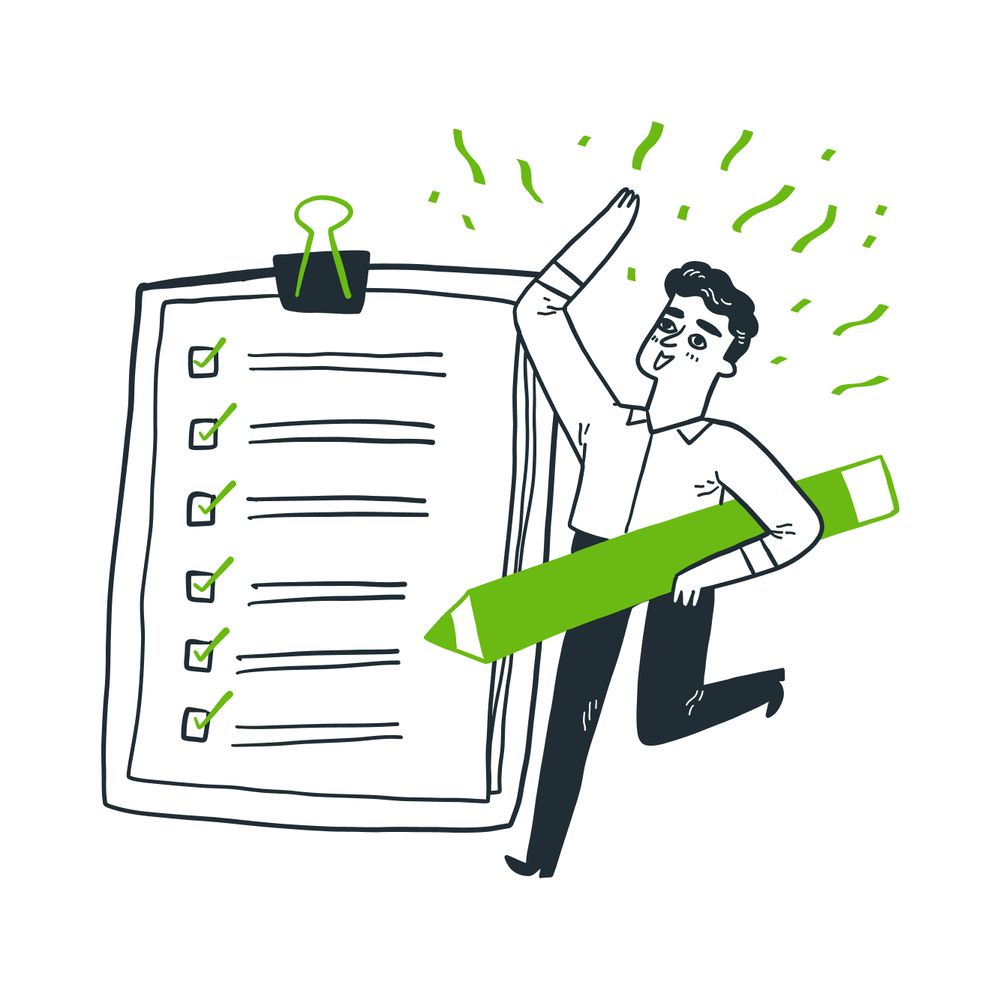When it comes to advancing in your software development career, a compelling performance self-review can be your strongest ally.
I remember my early days of coding, an era marked by floppy disks 💾 and fueled by endless cups of coffee ☕. Diligently jotting down my achievements and growth areas wasn't just a ritual—it was my strategic edge. Also, by sharing my self-review with my engineering manager before feedback sessions, I not only made his life easier but also introduced a unique vantage point, providing clarity on the term's highlights and challenges.
What Is a Performance Self-Review?
A performance self-review, also commonly known as a self-evaluation or self-assessment, is a reflective document that professionals write to evaluate their own job performance over a given period. It's an opportunity for introspection, to showcase your accomplishments, acknowledge challenges, and set aspirations for the future. In the realm of software development, it's your chance to shine a light on the code you've written, the solutions you've crafted, and the growth paths you've charted.
What Are the Benefits of a Performance Self-Review?
- Reflection: Self-reviews provide an opportunity for introspection and reflection, allowing individuals to assess their performance, strengths, and areas for improvement. It also leads to expressing yourself better and having better-quality conversations during performance reviews and one-on-one meetings.
- Goal Setting: Self-reviews facilitate the process of setting meaningful and specific goals for personal and professional development. It’s that simple: when you write down your goals, you achieve them faster.
- Self-Awareness: Engaging in self-reviews enhances self-awareness, helping individuals understand their emotions, motivations, and behaviors in the workplace. Human resource specialist Drew Hansen emphasizes the importance of heeding our inner voice. According to Hansen, self-aware individuals exhibit traits such as candidness, the ability to acknowledge mistakes, a desire for constructive feedback, and a subtle yet assured confidence.
- Accountability: Self-reviews foster a sense of accountability as individuals take ownership of their actions and progress, promoting a proactive approach to growth.
- Performance Improvement: By identifying areas for improvement through self-reviews, individuals can implement targeted strategies to enhance their skills, knowledge, and overall performance.
How to Write a Performance Self-Review?
Understand the Purpose
Begin by understanding the purpose and context of the self-review. Are you preparing for a retro or an important meeting with a stakeholder? Is it part of an annual performance review or a milestone assessment? Clarify the specific goals and criteria against which you will be evaluated. This understanding will help you align your self-review with the expectations of your organization or team.
Write down how you feel RIGHT NOW
When crafting a self-review it’s important to write down how you feel right now. For starters, ask yourself these three questions:
- How do I feel working at the company?
- How do I feel working with my teammates?
- How do I feel working on my current project?
Answering these questions will help you capture your current mood, perspectives, and emotional state, providing valuable context for your assessment. It will allow you to express any challenges, successes, or personal experiences.
The questions themselves are also good prompts to help you explore other parts of yourself and reflect more on parallel issues.
By acknowledging and articulating your emotions, you create a more holistic self-review that incorporates both objective achievements and subjective experiences, leading to a deeper understanding of your professional journey.
Reflect on Your Achievements
Take time to reflect on your accomplishments and contributions since your last performance review or one-on-one meeting. Highlight the projects you have completed, the software you helped ship out, the features you delivered (on time and within budget?), and any other innovative solutions you managed to implement successfully. Write down your blockers and reflect on how you managed to overcome them.
Get Feedback From Others
Do you have a principal engineer who acts as your mentor? Has somebody been doing a lot of reviews of your code? Now would be a good time to seek feedback from them. You could ask them how they view your achievements, too. You could also ask them if you’ve been communicating your ideas well.
Incorporate everyone’s suggestions and make sure your self-review accurately represents your contributions and growth. Remember, self-reviews are not set in stone, and the iterative process helps refine your assessment.
Also, if you’re self-assessing for a performance review, be sure to understand the criteria your evaluators (teammates or managers) will use to determine good performance. That way you’ll be able to match up your measurable results with theirs.
Identify Areas for Improvement
Being self-aware is a valuable trait in software engineering. After hearing from different stakeholders, take a moment to identify areas where you can grow and improve. It could be by doing more code reviews, leveling up your programming language, enhancing your collaboration or communication abilities, or adopting better practices. Demonstrate your willingness to learn and evolve by outlining steps you have taken or plan to take to address these areas.
Showcase Leadership and Teamwork
Software development is a holistic, sustainable people process. It’s rarely done in silos. Take a moment to write down the quality of your intra-team and inter-team collaborations, highlighting moments where you provided leadership, mentorship, or knowledge sharing. Discuss how you contributed to a positive team culture and fostered effective communication.
Align with Company Goals
After creating a meaningful map of where your personal and professional life intersects, now’s the time to connect your individual achievements to the broader goals and objectives of the company. Demonstrate how your work has directly impacted the success of projects, product development, or the overall business. Showcase your alignment with company values and missions, emphasizing how your contributions have driven the organization forward.
Moving Forward, Set Meaningful Goals
Include a section on your future goals and ambitions. Outline your aspirations for professional growth, technical skill development, or leadership roles. Make sure your goals are specific, measurable, achievable, relevant, and time-bound (SMART). This shows your commitment to continuous improvement and allows your superiors to understand your career aspirations.
Conclusion
The biggest pitfall to self-reviews is setting big goals without laying down smaller, measurable milestones. In the past, I’ve noticed many developers failing to meet any of those milestones (including myself), and they feel like they’ve let themselves down. Remember, growth is a lengthy process, but if you embrace self-reviews as a valuable tool for personal and professional development, it will propel you toward continuous improvement in your software engineering journey.
SAMPLE: Performance Self-Reviews for a Software Developer
Name: Monika DeLewis
Position: Junior Software Developer for The Big Batch Cookie Company.
I am writing this self-review to reflect upon my performance as a software developer and assess my strengths, areas for improvement, and overall contribution to my dev team.
Here is a summary of my accomplishments and areas to focus on:
- How do I feel right now? I feel good about my skill set and what I could bring to the project. I really like working for the company, and I get along great with my teammates and managers. The project does require a bit of thinking and technical knowledge, but when I don't understand something, I quickly find out. I'm not perfect, yet I've made it my mission to not let not knowing something be a blocker.
- Technical Skills. I feel that I have demonstrated proficiency in scripting programming languages like Node.js, frameworks like Express and Koa, and other tools necessary for efficient software development. I have the data to show that I've successfully delivered features on the Pistachio project where I utilized my technical expertise to overcome challenges and deliver high-quality solutions.
- Problem-Solving. Throughout my trial period, I’m happy to say that I approached complex problems with an analytical and positive mindset. I’m always looking for innovative solutions and I’m quite good at leveraging my problem-solving skills to tackle technical issues, particularly in relation to microarchitecture and using real-time collaboration tools. I have successfully resolved critical incidents in these areas and implemented preventive measures to minimize future occurrences.
- Collaboration and Communication. Although I’m a bit shy, I force myself to engage with teams, and sometimes with other stakeholders. To be honest, I could be better in this area. I have issues communicating technical concepts to both technical and non-technical stakeholders. I participate in team meetings though I’m not as active as I should be. I would like to share knowledge more, but I need to get better at getting my ideas across.
- Professional Development. I have participated in relevant workshops, attended two conferences - Web Summit and Digital Trust World - and I engaged in online learning platforms like Udemy to expand my knowledge. I actively seek feedback and guidance from senior developers, which has contributed to my growth. I'm considering starting a blog post next quarter to discuss anything new I'm learning.
Areas for Improvement:
- Time Management: I need to further improve my time management skills. For the next quarter, I will focus on prioritization, setting realistic timelines, and in better managing my workload to ensure the delivery of features.
- Documentation: While I have been attentive to documenting code changes and maintaining technical documentation, I understand the importance of improving this even further. I received feedback from Tomek and I hope to implement these best practices soon, probably this week.
- Knowledge Sharing: While I try to contribute to knowledge sharing within my team, I feel like I’m not taken seriously. I suppose I should organize workshops and make them more official as my teammates are quite busy.
Overall, I think I did well as an individual contributor during my trial period. I am really committed to improving and being a crucial asset to The Big Batch. I look forward to taking on new challenges, collaborating with the team, and delivering exceptional results in the upcoming evaluation period.
Monika DeLewis





